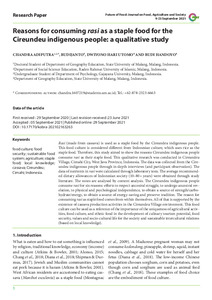Reasons for consuming rasi as a staple food for the Cireundeu indigenous people: a qualitative study
| dc.date.accessioned | 2021-10-27T15:35:15Z | |
| dc.date.available | 2021-10-27T15:35:15Z | |
| dc.date.issued | 2021-09-29 | |
| dc.identifier | doi:10.17170/kobra-202102163263 | |
| dc.identifier.uri | http://hdl.handle.net/123456789/13332 | |
| dc.language.iso | eng | eng |
| dc.rights | Namensnennung 4.0 International | |
| dc.rights.uri | http://creativecommons.org/licenses/by/4.0/ | |
| dc.subject | sustainable food system | eng |
| dc.subject | agriculture | eng |
| dc.subject | food security | eng |
| dc.subject | cassava | eng |
| dc.subject | Cireundeu | eng |
| dc.subject | Indonesia | eng |
| dc.subject | food culture | eng |
| dc.subject | staple food | eng |
| dc.subject | local knowledge | eng |
| dc.subject | Cimahi | eng |
| dc.subject.ddc | 300 | |
| dc.subject.ddc | 630 | |
| dc.title | Reasons for consuming rasi as a staple food for the Cireundeu indigenous people: a qualitative study | eng |
| dc.type | Aufsatz | |
| dcterms.abstract | Rasi (made from cassava) are used as staple food by the Cireundeu indigenous people. This food culture is considered different from the food culture of Indonesian people who generally make rice as their staple food. Therefore, this study aimed to show the reasons Cireundeu indigenous people consume rasi as their staple food. This qualitative research was conducted in Cireundeu Village, Cimahi City, West Java Province, Indonesia. Data was collected from the Cireundeu indigenous people through in-depth interviews and participant observation. Rasi are consumed by the Cireundeu indigenous people for six reasons: efforts to respect ancestral struggle, undergo ancestral revelation, independence in both physical and mental, obtain a source of strength/carbohydrate/energy, obtain a source of energy–saving and preserve tradition. All of that is supported by the existence of cassava production activities in the Cireundeu Village environment. The reason for consuming rasi as staple food comes from within themselves. This food culture can be used as a reference in development of sustainable and contextual national food security (based on local knowledge). | eng |
| dcterms.accessRights | open access | |
| dcterms.creator | Adiputra, Chandra | |
| dcterms.creator | Budijanto | |
| dcterms.creator | Hari Utomo, Dwiyono | |
| dcterms.creator | Handoyo, Budi | |
| dc.subject.swd | Ernährung | ger |
| dc.subject.swd | Nachhaltigkeit | ger |
| dc.subject.swd | Landwirtschaft | ger |
| dc.subject.swd | Ernährungssicherung | ger |
| dc.subject.swd | Maniok | ger |
| dc.subject.swd | Ernährungsgewohnheit | ger |
| dc.subject.swd | Grundnahrungsmittel | ger |
| dc.subject.swd | Lokales Wissen | ger |
| dc.subject.swd | Indonesien | ger |
| dc.type.version | publishedVersion | |
| dcterms.source.identifier | eissn:2197-411X | |
| dcterms.source.issue | No. 3 | |
| dcterms.source.journal | Future of Food: Journal on Food, Agriculture & Society | eng |
| dcterms.source.volume | Vol. 9 | |
| kup.iskup | false | |
| dcterms.source.articlenumber | 389 |


